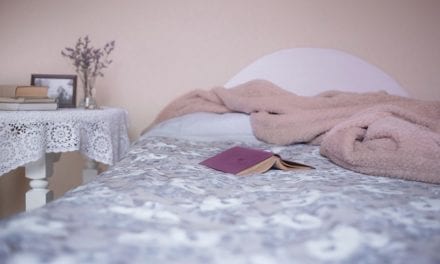I
The wooden leg of the straight-backed chair groaned as the boy scooted it over the hardwood floor, a few inches closer to the bed. The room was dim, with sheer curtains allowing some gray morning light to filter in through the windows, while blocking the view of the late-autumn drizzle outdoors. The room was still, except for the coarse breaths of the old man. A stale, sweet smell hovered in the air.
Outside it was quiet. The chitter of birds littered the silence in the side and back yards. Otherwise it was quiet. Sunday mornings were always peaceful, unlike the busier weekdays, with the clatter of shops opening, children walking shrilly to school bus stops, and automobiles starting their commute to jobs on the outskirts of the small mountain town. Soon, the noise would begin to pick up a bit, as families and older couples bundled against the autumn chill would begin their walk to one of the half-dozen churches within a few blocks of downtown.
The boy had worked for the old man and his wife for a bit over a year. He had moved to the small town from another, smaller town, out on the plains, the summer after his junior year in high school. That was after his parents were killed by a drunk driver. He had grown up as an only child on their small dairy farm, and he learned to work hard, helping care for the farm and the cows, and his family lived modestly but comfortably. He was a hard worker, but also thoughtful; he kept a journal in which he wrote every day.
After his parents were killed, the farm had to be sold, but for little profit. The boy was taken in by his aunt and uncle in the mountain town where they too lived quite modestly. Times were difficult for everyone after the crash of 2008.
Soon after beginning to settle into his new school, the boy started to look for a part-time job to help make ends meet. Jobs for young adults were not plentiful in the town, unless you were adept at whitewater rafting in summer, or skiing in winter. The boy could milk a cow, herd cattle into a corral, or bale hay, but he could not guide a whitewater raft tour or be a ski instructor.
Every week his finger would trace down the short column of “help wanted” in the classified section of the semi-weekly town newspaper. For weeks there was nothing, until, “Assisted living attendant wanted. Work involves daily care for nearly bedridden patient, including personal hygiene, cooking, and general assistance. Must be able to lift and carry.” That very day he called the number in the ad and spoke with a woman, who invited him to visit and interview. “Yes, ma’am. Tomorrow morning would be just fine.”
The boy arrived at the house fifteen minutes before the scheduled time. It was a small bungalow, right in the middle of town, conveniently located to everything. A tidy rock garden decorated the compact front yard. A few odd, man-sized metal sculptures were placed around it. As he walked up to the door and prepared to knock, he was suddenly aware that his mouth was dry. He hesitated a moment, then rapped on the small square window in the upper portion of the door.
The woman came slowly. He could see her through the window. She was older, easily in her seventies. Her short gray hair cropped her face like the caps that his mother would wear swimming to keep her hair dry in days long gone. The woman unlatched the door and gave him a sweet smile, inviting him in for tea and to chat.
The boy took the seat at the kitchen table she offered him. The delicate china cup made a pleasant clink as she set it on the table before him. She began to pour the steaming tea from an ancient metal pot.
“My husband is dying. He has bladder cancer. It was already pretty advanced when they found it. He had surgery and radiation, but they told us there was no cure. That was about two years ago.”
The boy did not know what to say. Finally, “I am sorry.”
“I know. Me, too. But no way was he going to go down easily. He was determined to keep writing, and he’s been writing more, at a pace like no other before.
“But now… it’s just become too much. He has no energy any more. He can’t fix his own boiled egg in the morning. He can’t get up to sit on the living room couch to watch people passing by. He can’t get himself into the tub to bathe himself, and even getting to the bathroom to relieve himself is difficult. He can’t go back to his ‘writing shed’ in the back yard to work on his recent poems.”
“I am so sorry to hear that.”
“Thank you.” She bit the top of her upper lip. “I tried to make up for what he can’t do any more, but I can’t. I can’t do it anymore. I don’t have the strength to help him to the bathroom, and I can’t even begin to help lift him into the tub. My own back is bad. Slipped disc, and surgery three years ago. I just can’t do it. That’s why we decided to look for help.”
“Well… I don’t have any experience with helping sick people. But I am strong, and I can lift and carry someone to the bathroom, or whatever. And… I have had to learn how to boil an egg, and I can do a little more cooking than that.”
“Fine,” she said, grinning. “When can you start?”
“Well, I guess right away on weekends. And maybe a couple of hours in the afternoon a couple of days a week.”
“Great. How about starting next Saturday. Say… 7 a.m.?”
“Wow. Sure. OK. Uhm… Would it be okay for me to meet your husband?”
“Of course.”
II
The boy fell quickly into a routine at the old man’s home. After school he went directly to the house. He would sit for fifteen or twenty minutes with him, and he would try to chat with the old man, making small talk about the weather, or sports. The old man never said much. He was polite, and seemed to be listening, but rarely responding. Sometimes his silence seemed to convey only that he was annoyed.
Still, the routine developed. After their chat, the boy would help the old man with his bath. First he would fill the tub. He learned quickly the temperature the old man liked, and the woman showed him the other things he needed to learn.
Oxygen tubing trailed from his nose to a compact machine on the floor. The boy would unplug the tubing, plug it back into a small, portable oxygen tank. The tubing was long, and he carried the tank the short distance to the bathroom before returning to help the old man up and to his walker. Together they would make their way, one short, slow step at a time, inching the walker forward. When they got to the tub, the boy would remove the old man’s hospital gown, put his arm around him, move the walker, and pick the old man up, gently placing him in the water. He was far lighter than the bales of hay the boy was used to tossing back on the farm.
The old man would moan at one of the few pleasures he still enjoyed. Once he was settled in the water, the boy would tenderly scrub his back and arms with a soapy wash cloth. Then his chest and legs. Last, his scrotum and, helping to rotate the old man slightly, he would gently wash his bottom.
The old woman had large, thick and very clean towels at the ready, and the boy would take one in his hands before helping the old man to his feet, and he would wrap him warmly, softly drying him. And then the journey would begin in reverse, until once again the old man was gowned and comfortably tucked into his bed. The whole adventure took nearly two hours, during which the old woman would be preparing supper. And it would be time for the boy to head home. Later in the evenings, the boy would write in his journal about his day, and about the old man.
This routine continued for several months, until the old man became too unsteady for the walk to the bathroom and the portage into the tub, and the tub baths gave way to sponge baths in the bed.
On weekends the boy spent more time at the house. There was the bathing routine, but there was also more time to chat.
One Saturday morning, during their “chat,” the old man surprised the boy.
How was school this week?
And the boy would answer, “Good. Still getting used to a new school. It’s hard. Everybody here… they all know each other already and it’s not easy to make friends. I guess I am shy anyway.”
“Any friends yet at all?” the old man would whisper between short, harsh breaths.
“Yeah. A couple. A couple of the guys wanted me to go out for the football team. I played for my old school, but I told them I didn’t have time now.”
“That’s too bad. What about girls?”
“Oh, no… I don’t have time.”
The next few weeks were the same as before. The old man seemed even more sullen, talking less and less, and then only to answer questions. The boy just accepted this and tried not to take it personally. He assumed the man was in pain a lot of the time, until on another Saturday morning, the old man asked the boy about his plans.
“I’m sorry. What plans do you mean?”
“Well, of course I mean when you are older. Are you going to take care of dying old men the rest of your life?”
“After high school, I hope I can go on to college.”
“Good. What do you want to study?”
“Well, actually I was thinking I wanted to study creative writing. I’ve dreamed of the program at Colorado College, if only I can get in and can afford it.”
When he had first come to work for the old man and his wife, the boy had not known the old man seriously wrote poetry, much less that he was a well-known and highly regarded poet. Soon after learning this, he went off to the small library downtown and checked out three books of the old man’s poetry. That night, he had stayed up until the small hours of the morning, reading those books, and he was captured, mesmerized.
At first the boy did not say anything to the old man about reading his poetry, but later, during one of their longer chats, he asked about one of the poems. “What is this really about?”
“What do you think it is about?” the old man replied.
“I am not sure.”
“Then you shouldn’t even be asking the question, should you?” The old man seemed angry, and the boy, feeling chastised, fell silent. This time, it was difficult not to take the old man’s words personally.
III
It was early Sunday when he got to the house, but there were already three other people in the room—the old man’s daughter and grandson, and of course, his wife. She had asked the boy to come and join them. Both the boy and the woman were quiet. The old man’s daughter and her son were more busy. Henry was only four years old, and he had no idea what was going on. Solemnity was not in his vocabulary, and his mom was responsible for keeping the decorum.
Henry’s mom was a good planner. She’d brought Henry’s LEGO collection. And he was, mostly, involved with creating a LEGO castle with LEGO warriors. He sat in one corner of the room, occasionally issuing warnings that were understandable only to the LEGO defenders. For the most part, though, the room was quiet.
The old man lay in the bed, his back and neck and head propped up by pillows, so that he was half sitting. He watched the others in the room with vague interest.
“May I have a sip of tea?” he whispered to his wife. These were the first words he’d uttered the entire morning.
“Yes, dear.” And she rose and walked to the kitchen where there soon was the whistle of a tea kettle. She brought a steaming cup of tea to the bedside. He took the cup shakily, his wife with hands poised below, just in case, and he took a sip.
“Honey?” the old man whispered from his bed. “I think it is time now.”
His wife started to weep, silently, not dramatically, just hanging her head, and letting the tears slowly run down her cheeks, and onto the sheets of the bed.
“I know,” she said.
Just then, his daughter grabbed Henry’s arm firmly for some LEGO transgression, whispering firmly.
The old woman lifted a small plastic cup and brought a spoonful of apple sauce to her husband’s lips. Then she repeated this two more times, the last after scraping clean the bottom of the cup. The old man looked at her, and said, “I love you.” And to his daughter, the same thing.
And then, “Bye, Henry.”
Finally, turning to the boy, he looked him in the eye, and said, “I’ll see you on the other side.” Then he closed his eyes. Within ten minutes, his breathing had become a soft snore, and in twenty it slowed to about four breaths a minute. Finally, there were no more breaths at all.
The boy and the two women sat in their chairs around the bed. Henry sat on the floor with his LEGOs, occasionally making the sounds of a revving truck. They sat in the dim light for a long time, not speaking. Even Henry was mostly quiet.
The wife was the first to move. She scooted her chair back, rose, and walked into the kitchen. The boy could hear her on the phone. “My husband has just passed away.” She gave her address. When she returned, the daughter was picking up LEGOs, with Henry’s help, and putting them in the box where they were kept.
The boy stood up and went to the wife, putting his arms around her. “I will miss him.”
“So will I,” she replied. “Here. He wanted you to have this.” She handed him a slim book, the most recent collection of the old man’s poems. The boy took the book in his hands and said thank you. “I will treasure this.” Then, he slowly walked through the living room to the front door, closing it quietly behind him as he stepped onto the porch. Only then did he open the book. His name was inscribed shakily on the title page, along with the words, “Whatever you want these to mean, that is what they mean.” He closed the book carefully, and stepped off the porch.
The walkway was wet, and the air smelled of fresh rain. The sun was beginning to break through the overcast. Chickadees hopped through the side yard grass, foraging for seeds. Next door, the sound of children’s voices drifted from barely opened windows as they dressed for church.




















